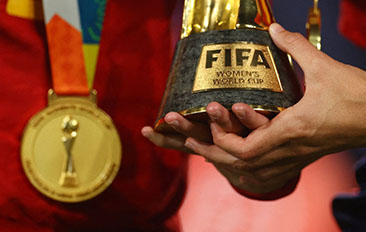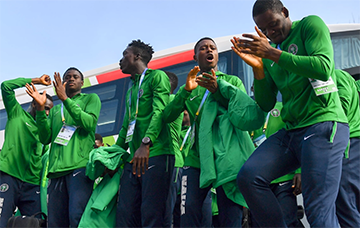WOMEN'S FOOTBALL
Spanish federation chief refuses to resign over kiss scandal
Spanish soccer boss Luis Rubiales refused to quit on Friday for kissing World Cup star Jenni Hermoso on the lips after Spain’s World Cup victory, fuelling anger among players and government ministers who decried his actions as unacceptable macho behaviour.
Speaking at an emergency meeting of the Royal Spanish Football Federation (RFEF), Rubiales complained that “false feminists” were “trying to kill me”.
He described the kiss as a “little peck” that was “spontaneous, mutual, euphoric and consensual”.
“Is a consensual peck going to take me out of here? I won’t resign. I will fight until the end,” Rubiales said, drawing applause from the predominantly male audience.
Criticism of Rubiales’s behaviour has built throughout the week. The incident occurred while the players were being handed their medals after they beat England 1-0 in the World Cup final in Sydney, Australia, on Sunday.
As players filed past, Rubiales grabbed Hermoso by the head and planted a kiss on her mouth.
The government confirmed on Friday it will take the incident before a sport tribunal where, if it can be proven the kiss was non-consensual, he could be tried under a sexual violence law introduced by the ruling Socialists last year.
Rubiales’ speech at the RFEF assembly drew immediate condemnation from acting Labour Minister Yolanda Diaz, who described it as “unacceptable”.
“The government must act and take urgent measures: impunity for macho actions is over. Rubiales cannot continue in office,” Diaz wrote on social media.
Acting Equality Minister Irene Montero said the state prosecutor and the state-run sport council (CSD) should act to protect Hermoso.
Gender issues have become a prominent topic in Spain in recent years. Tens of thousands of women have taken part in street marches protesting sexual abuse and violence.
The Socialist-led coalition government has presided over a raft of legal reforms, including around equal pay, abortion, sex work and transgender rights.
Rubiales, 46, said in his speech that it was Hermoso who initiated physical contact by lifting him off the ground by his hips. He said he asked Hermoso if he could give her “a little peck” and she said “OK”.
Full footage of the medal awards ceremony was not broadcast on Spanish television.
“This is unacceptable. It´s over. We´re with you, teammate Jenni Hermoso,” her teammate Alexia Putellas said on X.
Some male players also protested. Borja Iglesias of Real Betis, who last played for Spain in 2022, said on X he would not put himself forward for selection for the national team “until things change and these kinds of acts don’t remain unpunished”.
At the event on Sunday, Rubiales was also seen grabbing his crotch in celebration while standing next to Queen Letizia in a box at the stadium, for which he apologized on Friday.
FIFA opened disciplinary procedures against him on Thursday after Hermoso said in a statement her union was working to defend her interests and that such acts should “never go unpunished”.
The football players union FIFPro said in a statement it had written to UEFA, where Rubiales is vice president, requesting that it also start disciplinary proceedings.
“I am embarrassed by the shame that it continues to be for Spanish football to have a president of the (RFEF) who continues to cling to office,” FIFPro President David Aganzo said.
Three members of the assembly interviewed by Reuters as they left Friday’s meeting said they were caught by surprise as they had expected Rubiales to resign.
The members from Galicia and Andalusia, who declined to give their names, said they felt the issue was overblown, a sentiment they said was shared by most of the members present. Only about half of the membership was present.
Rubiales met with key federation members shortly before the assembly and told them about his plans not to resign, according to a federation source.
The only person who objected was Rafael del Amo, president of the national committee for women’s football, who said he would step down from his roles, which also included the vice presidency of the federation.
-Reuters
WOMEN'S FOOTBALL
Two Nigerian women’s clubs get financial boost from FIFA

Following the record-setting FIFA Women’s World Cup Australia and New Zealand 2023, 1,041 clubs from 48 FIFA Member Associations across all six confederations are to receive a share of the revenue for the release of players who participated in the tournament.
Going by the final list of players submitted by the Nigeria Football Federation (NFF) to the tournament, two domestic club sides, Abia Angels and Rivers Angels will profit from the $11 million largess.
The funds have been made available via FIFA’s Club Benefits Programme (CBP), which was introduced ahead of the FIFA Women’s World Cup France 2019 to recognise the fundamental role that clubs play in developing players. The total amount committed to clubs that released and/or trained the stars of women’s football rose to USD 11.3m for the 2023 edition of the FIFA Women’s World Cup™ from USD 8.48m four years earlier.
Nearly two million fans at the tournament’s ten stadiums – and two billion following around the world – witnessed a new standard of women’s football at last year’s FIFA Women’s World Cup, and now the clubs that played integral roles in shaping the talents of all 736 players at the tournament are to be rewarded.
“Strong clubs are crucial to the growth of women’s football, so distributing funding to over 1,000 clubs that have been instrumental in developing the world’s top female footballers is just one way that FIFA can offer its support,” said FIFA President Gianni Infantino yesterday.
“What’s truly unique about this programme is that FIFA does not only reward the clubs that released the players for the tournament but also the clubs that have contributed to each player’s development between the ages of 12 and 22.
This development also means that most of the players who began their careers in Nigeria before their sojourn overseas will benefit from the gesture from the world football body.
“This model ensures that crucial funding as well as the incentive for clubs to provide the best possible training and environment for female talent – reaches every part of the global football ecosystem, benefiting grassroots and professional clubs.”
The number of clubs that were identified by FIFA as eligible to receive payments via the FIFA Women’s World Cup 2023 CBP increased by 219 clubs from 822 in 2019 to 1,041 in 2023. Positively, the number of clubs across FIFA’s Member Associations also increased from 39 in 2019 to 48 in 2023.
Each club’s share has been determined by the role that they played in a player’s development or participation in the tournament, either as a releasing club, a training club, or both.
Each eligible releasing club will receive an equal amount per player per day at the tournament, counting from the beginning of the release period (10 July 2023) and finishing the day following the last match of the player’s national team at the tournament.
Each training club will receive an amount based on the number of training periods the player spent at the club between ages 12 and 22, with each year consisting of a maximum of two training periods. The number of days that the player spent at the tournament is also factored in, however, the number of minutes played by a player in any given match at the tournament is irrelevant, with all players treated equally based on the number of days that they were at the tournament.
In the 1,043 clubs, UEFA dominated in numbers with 581 Asia Federation was next with 151 clubs while CONCACAF was next with 108 just as COMEBOL followed with 95 and then CAF with 76 clubs and Oceania Federation took the rear with just 30 clubs.
WOMEN'S FOOTBALL
CAF Women’s Champions League Qualifiers draw holds on Wednesday

The 2024-2025 women’s interclub football season will officially kick off on Wednesday, 24 July, with the draw for the CAF Women’s Champions League qualifiers in 4 zones: UNAF, UNIFFAC, WAFU B and CECAFA.
The draw will be conducted at 10:00 GMTat the CAF Headquarters in Egypt and live-streamed on CAF TV and CAFOnline.com.
Below are the teams entered by zone and the dates of the qualifying tournaments:
WAFU B (10 – 23 August): Ainonvi FC (Benin), Hasaacas Ladies (Ghana), Inter d’Abidjan (Côte d’Ivoire), AO Étincelles OU USFA (Burkina Faso), AS Garde Nationale (Niger), Edo Queens (Nigeria), ASKO de Kara (Togo).
UNAF (21 – 31 August): CF Akbou (Algeria), Tutankhamun (Egypt), AS Far (Morocco), ASF Sousse (Tunisia)
CECAFA (17 August – 4 September): PVP Buyenzi (Burundi), FAD (Djibouti), CBE FC (Ethiopia), Kenya Police Bullets (Kenya), Kawempe Muslim (Uganda), Rayon Sports (Rwanda), Yei Joint Stars (South Sudan), Simba Queens (Tanzania), Warriors Queens (Zanzibar)
UNIFFAC (16 – 24 August): Lekié FF (Cameroon), TP Mazembe (DR Congo), Atlético de Malabo (Equatorial Guinea), CSM Diables Noirs (Congo)
WOMEN'S FOOTBALL
Colombia 2024: Danjuma invites 32 as countdown begins to Final Tournament

With just eight weeks to their first match of the FIFA U20 Women’s World Cup Colombia 2024, Head Coach Chris Musa Danjuma has called up four goalkeepers, eight defenders, eight midfielders and 12 strikers to a training camp in the Federal Capital, Abuja in the first phase of preparation for the global tournament.
Team captain Oluchi Ohaegbulem is top of the list, with first-choice goalkeeper Faith Omilana, defenders Shukurat Oladipo and Comfort Folorunsho, midfielders Chinyere Kalu, Adoo Yina and Rofiat Imuran, and forwards Janet Akekoromowei, Flourish Sabastine and Aminat Bello also called.
Nigeria, a fixture at the FIFA U20 Women’s World Cup finals since the tournament began as an U19 event in Canada 22 years ago, will contend with three-time winners Germany, Asian powerhouse Korea Republic and South American representatives Venezuela in group D of the competition scheduled for three Colombian cities, 31st August – 22nd September.
All the invited are expected at Serob Legacy Hotel, Wuye, Abuja on Sunday, 7th July.
ALL THE INVITED PLAYERS:
Goalkeepers: Anderline Mgbechi (Delta Queens); Rachael Unachukwu (Nasarawa Amazons); Faith Omilana (Naija Ratels); Shukura Bakare (Nasarawa Amazons)
Defenders: Oluchi Ohaegbulem (Nasarawa Amazons); Jumoke Alani (Nasarawa Amazons); Shukurat Oladipo (FC Robo Queens); Oluwabunmi Oladeji (Naija Ratels); Folashade Adegbemile (Delta Queens); Chidera Okenwa (Delta Queens); Comfort Folorunsho (Edo Queens); Taiwo Lawal
Midfielders: Adoo Yina (Nasarawa Amazons); Olushola Shobowale (Nasarawa Amazons); Aminat Folorunsho (Rivers Angels); Chioma Olise (Edo Queens); Chinyere Kalu (Nasarawa Amazons); Joy Igbokwe (Naija Ratels); Rofiat Imuran (Stade de Reims, France); Zikora Agama (Naija Ratels)
Forwards: Delight Nwosu (Dannaz Ladies); Adaobi Okah (Remo Stars Ladies); Chiamaka Okwuchukwu (Rivers Angels); Chinaza Agoh (Delta Queens); Mary Nkpa (Heartland Queens); Chiamaka Osigwe (Edo Queens); Janet Akekoromowei (Asisat Academy); Mary Offor (Adamawa Queens); Flourish Sabastine (Stade de Reims, France); Sharon Ulumma (Heartland Queens); Aminat Bello (Otero College, USA); Reilly Adebowale (Bohemian FC, Republic of Ireland)
-

 Nigerian Football1 week ago
Nigerian Football1 week agoI prefer a foreign coach for the Super Eagles, says Amaju
-

 Olympics5 days ago
Olympics5 days agoBrazilian women train in Zidane’s birthplace ahead of Nigeria Super Falcons clash
-

 Premier League1 week ago
Premier League1 week agoNigerian-born Man United’s new striker promises creativity and unpredictability to fans
-

 Olympics13 hours ago
Olympics13 hours agoThis is my story: Odegbami on how he is stranded in London
-

 Nigerian Football1 week ago
Nigerian Football1 week agoOsimhen’s outburst was a moment of madness, says Amaju
-

 OBITUARY1 day ago
OBITUARY1 day agoBREAKING! Former Heartland FC owner, Iwuanyanwu, dies at 81
-

 Olympics6 days ago
Olympics6 days agoTeams plan for lack of toilets on Paris opening ceremony barges
-

 Olympics1 week ago
Olympics1 week agoWhat you need to know about the Paris 2024 Olympics opening ceremony


